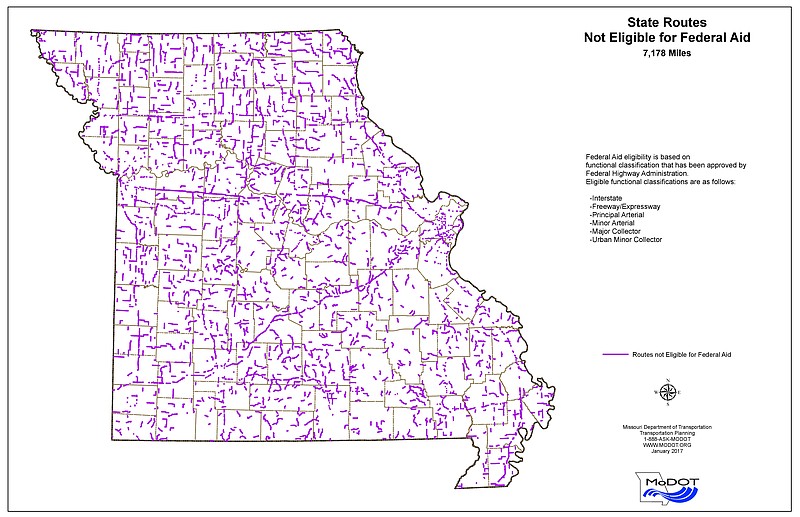Missouri lawmakers once again ended a legislative session without solving Missouri's transportation funding issues.
But last week, they approved a resolution creating a "21st Century Missouri Transportation System Task Force."
The resolution, authored by state Rep. Kevin Corlew, R-Kansas City, and handled in the Senate by Sen. Bill Eigel, R-St. Charles, said the 23-member task force's mission is to:
- Evaluate the condition of Missouri's transportation system, including roads and bridges, and the current transportation funding plan.
- Evaluate whether that funding is sufficient to maintain the current system and ensure it serves Missouri's future transportation needs.
- Make recommendations regarding the system's condition and its funding.
They have until Jan. 1 to file a report and make any recommendations.
State Sen. Mike Kehoe, R-Jefferson City, served on the Highways and Transportation Commission before running for the Legislature.
He told the News Tribune last week that when the resolution came up for debate last Wednesday, "I thought, all we do is study this thing."
But a statewide "Blue Ribbon" panel to study transportation worked "seven or eight years ago," Kehoe said, "so lots of things have changed. It's time to make sure that we understand what all the pieces are on the table."
Sen. Jeanie Riddle, R-Mokane, said: "Everybody knows we have to do something, and we don't have the solution, yet."
During last week's almost two-hour debate on the task force resolution, Sen. Gary Romine, R-Farmington, asked, "How many times are we going to study this before we come up with a solution to the problem?"
Eigel hopes to be a task force member, and that it will present a workable solution.
"My hope is that we're going to come up with a more unified approach and a consensus about what direction we need to move," he explained. "As I've said before, my perspective is that the problems facing our transportation infrastructure in the state of Missouri have nothing to do with a lack of money.
"It has to do with a lack of the will to prioritize dollars that are, already, coming to Jefferson City, to take care of one of the highest priority needs of the state."
He's proposed a 10-year plan of using some general revenue funding to help pay for transportation improvements.
"(People) are already sending more of their money to Jefferson City than ever before," Eigel said. "We already have the resources at our disposal."
He opposes the call for increasing the state's 17-cents-a-gallon motor fuels tax - which has been at that level since 1996 and now is one of the nation's lowest.
Sen. Doug Libla, R-Poplar Bluff, reminded Eigel: "As you know, we have not had a revenue adjustment in 21 years. I'm just saying, logically thinking, when you go to a pizza place, are you still paying 1996 prices?
"The reason we have a revenue problem is a courage problem," Libla said.
Patrick McKenna, MoDOT's director, told the News Tribune: "We are in favor of creating an action plan to solve the transportation funding issues in the state of Missouri - and are hopeful that the Task Force will provide additional information and public forum to accomplish those aims."
He noted the department has posted information online to help the public understand the issues: A Citizen's Guide to Transportation Funding in Missouri, which can be found at www.modot.org/guidetotransportation.
"We have outlined many of the issues regarding how the transportation system is currently funded," McKenna explained, "how much citizens pay today, how resources are allocated among the regions of the state, the system condition today - and what the deficiencies in the system cost citizens and what it would take to fix the problem."
Freshman Sen. Jacob Hummel, D-St. Louis, said during last week's debate: "We have a severe problem right now. It's not coming in the future."
McKenna told the News Tribune the current system of relying on fuel taxes "has traditionally been a fiscally conservative approach and has been successful in building the extraordinary system that we benefit from today. The only thing wrong with this funding mechanism is that it has not kept pace with inflation - and there has not been political will to adjust as needed for the past two decades."
In the 1950s, many of Missouri's counties successfully asked MoDOT to take-over the "farm-to-market" roads that today are many of the state's numbered and lettered highways.
Eigel thinks the state could save some money if it returned about 7,000 miles of those roads to the counties - because they don't qualify for using federal dollars for their construction or maintenance.
"That question is, probably, the most emotionally charged question that I've come across in the transportation discussion," Eigel said. "I do think, based on my research with MoDOT, that certain roads that have very little traffic, and that serve very few citizens, are better-served at the local level."
In Cole County, that would include 18.94 miles of road, including several small sections of old U.S. 50 and 54.
In Callaway County, Eigel's plan would include 116.98 miles, while Boone County's Non-Federally Aided roads cover 106.31 miles currently maintained by the state.
McKenna said: "The task force should help us consider and develop promising new funding ideas and consider and reject others, which is all part of developing good public policy to solve societal issues."

